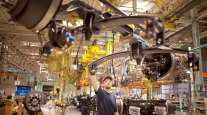Senior Reporter
September Class 8 Orders Decline

[Stay on top of transportation news: Get TTNews in your inbox.]
North American Class 8 orders in September dropped 10.9% compared with a year earlier, ACT Research reported as truck makers struggled to match pent-up demand amid a badly out-of-kilter supply chain and a production schedule that continues to defy typical certainty.
Orders slid to 27,400 compared with 30,768 a year earlier, according to ACT, citing truck makers’ preliminary data.
“Quite honestly, with the backlog where it is right now and the manufacturers’ challenges in trying to get all the necessary ingredients to make a truck, I thought this was an awfully good number,” ACT Vice President Steve Tam told Transport Topics.
Preliminary NA Class 8 net orders in September were 27,400 units, while NA Classes 5-7 net orders dropped to 24,500 units, both representing lower sequential readings.https://t.co/zGJWKFeFAH#truck #semitruck #trucking #transportation, #ACT, #ACTResearch pic.twitter.com/Ok1wfDODyO — ACT Research (@actresearch) October 6, 2021
He added it was not a 50,000-truck order, but ACT was not expecting that. “Not what we were looking for, or counting on. But demand remains solid. I don’t think this represents any change in that picture.”
FTR pegged preliminary net orders at 28,100.
“Unfortunately, the supply chain remains a huge mess. Parts and components are so constricted, as well as raw materials, it will take many months to rectify,” said Don Ake, vice president of commercial vehicles at FTR.
Add to this the robust demand expected next year due to sturdy freight growth, Ake said. “The fleets have a tremendous need for new trucks in 2022, however, the truck makers are delaying entering orders until the supply chain situation is clearer.”
Initially, almost everyone thought the difficulties in the supply chain would be temporary, said John Adami, principal at NW Heavy Duty, which works to accelerate the visibility, impact and long-term profitable growth of Tier 1 suppliers at Paccar, Volvo Group, Daimler Trucks North America and Navistar.

Adami
“I think we all framed it alongside a lot of the other issues that were going on culturally,” he said, “whether it was the surge in COVID-19 cases, or civil unrest in some of our urban areas, or wildfires. You expect these things to have a season; they come and they go. They might not dissipate completely, but their impact will decrease. We’ll move on to something else.”
The feeling now with the [disrupted] supply chain issue is different,” he said. “The cause of it is so complex.”
Shortages, at times, have included tires, wiring harnesses and semiconductors.
Adami was especially critical of the nuanced situation with semiconductors, where supply is limited, sometimes intentionally, and demand is strong.
“Did anyone anticipate there would be this kind of middle market emerging; that people would be, in effect, hoarding chips at the distributor level,” he said. “And then marking up the prices to exploit the conditions. That phenomenon is having a real impact today and I don’t know if it was anticipated 60, 90 120 days ago. So it’s factors like those that are unforeseen and extending this situation.”
Adami added: “I do think COVID-19 has created the largest block of inefficiency. Reduction in COVID-19 cases and in people’s fear of COVID-19 will be an important lubricant and an important accelerant that gets us back on track.”
Meanwhile, Tam said, “We have, as an industry, been living with the current situation for long enough, and I don’t want to say the level of comfort is increasing, but perhaps the tolerance for uncertainty is increasing.”

For some, truck driving is a passion, and the best are America's Road Team Captains. ABF driver Nate McCarty, former America's Road Team Captain, and Elisabeth Barna, COO and executive vice president for American Trucking Associations, join us. Hear a snippet above, and get the full program by going to RoadSigns.TTNews.com.
It is possible orders will remain in this September range — or well above replacement — for an extended period of time, he said.
The North American replacement level is considered to be about 19,000 orders per month, or 228,000 a year.
Orders through the first nine months this year reached 299,000. That is more than all of 2020, when total orders cleared 278,000.
He noted truck makers are working on getting any partially completed, or red tag, trucks completed and delivered, and then looking to accept orders from some customers to keep that pipeline flowing.
Paccar Inc. reported Oct. 4 the ongoing global semiconductor shortage will reduce its truck deliveries in the third quarter by 7,000 vehicles to an estimated 33,000, compared with 40,100 vehicles delivered this year in the second quarter.
Bellevue, Wash.-based Paccar, whose North American brands include Peterbilt Motors Co., and Kenworth Truck Co., as well as DAF in Europe, anticipates the semiconductor shortage and associated production inefficiencies will continue in the fourth quarter.
Want more news? Listen to today's daily briefing below or go here for more info:


